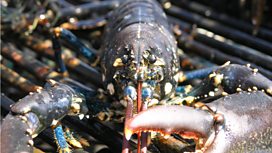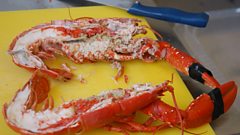Lobster
Brett Westwood looks at how the lobster has become an epicure’s delight, an improbable sex symbol, a sign of a luxurious lifestyle and even a muse for surrealist artists. From 2016
Brett Westwood looks at how the lobster is a creature that when drawn up from the deep is made to shed its natural identity as an ancient predator of the sea floor and has become an improbable sex symbol, an epicure's delight, a muse for surrealist artists a fearsome little nipper thanks to those pincers. Not all lobsters have claws, but the ones in this programme do. They’re the European and American species, which come equipped with enormous claws like oversized boxing gloves, and a tough armour evolved to withstand the rigours of life on the rocks.
Original producer: Tom Bonnett
Archive producer for Βι¶ΉΤΌΕΔ Audio in Bristol : Andrew Dawes
Revised repeat - first broadcast in a longer form on 5th July 2016
Last on
![]()
How five seafoods floated to the top.
Clip
-
![]()
How the lobster got its ticket to stardom
Duration: 02:16
Dr Paul Clark

For the lastdecade his work has focused mainly on research; taxonomy and systematics of decapods, brachyuran crab larvae, some eel studies, invasive decapoda and riverine plastic litter.
Dr Giovanni Aloi

In 2006, he founded , the Journal of Nature in Visual Culture. It is an international reference point for the debate on animals in the arts. He is the author of Art & Animals and is currently working on two monographs, one on taxidermy in contemporary art and another on plants in contemporary art, both due for publication in 2016.
Trevor Corson

His first book, , began as a centerpiece article in the Atlantic that was included in the Best American Science Writing edited by Oliver Sacks. To research the book Trevor lived on a small island off the Maine coast for two years while working full-time as a crew member on a lobster boat, then spent months holed up in laboratories and zoology libraries learning about the surprising soap opera of decapod mating habits.
Dr Charlie Ellis

He has studied the population ecology of European lobsters in Cornwall and the Isles of Scilly and his Univrsity of Exeter PhD thesis examined the stock enhancement project run to conserve the species at the National Lobster Hatchery.
This project aims to use genetic markers to test population structure and reproductive ecology in local lobsters, and provide lobster hatcheries and alternative stock conservation measures with a genetic method to identify released animals, enabling assessments of how well they contribute to the sustainability of pressured or depleted marine populations.
Dr Zoe Jaques

Her most recent book, , considers how questions of the animal, environment and technology emerge in children’s fantasy literature and film. She also has an interest in book history and illustration. She has published extensively on Lewis Carroll’s Alice.
Olivia Orchart

Len Walters

Mandy Walters

She encourages people to try her produce and teaches people how to cook it as she believes this, and the weather, are the main reason people in Wales have not traditionally eaten this local food.
Broadcasts
- Tue 5 Jul 2016 11:00Βι¶ΉΤΌΕΔ Radio 4
- Mon 11 Jul 2016 21:00Βι¶ΉΤΌΕΔ Radio 4
- Sun 26 Jun 2022 06:35Βι¶ΉΤΌΕΔ Radio 4




